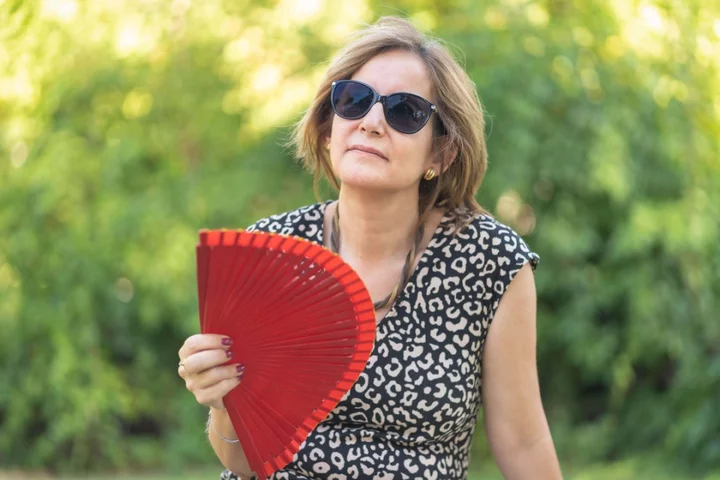
Artificial intelligence got you freaked out? Watch these movies to feel better (or totally validated)
Based on who you talk to, artificial intelligence (AI) is either going to save the world or destroy it.
2023-06-15 00:18

My teenager gets all their news from TikTok – should I worry?
Journalists are no longer the gatekeepers. The reality is that many young people are now bypassing the websites and apps of traditional news outlets and seeking information on social media platforms, including TikTok. It’s the ‘fastest growing social network’, according to the Reuters Institute Digital News Report, and new research has found that 20% of 18-24 year olds use the app solely to find their news. While a massive 44% of that age group use the short-form video hosting service for any and every other purpose. The younger generation have “little interest in many conventional news offers oriented towards older generations’ habits, interests, values, and instead embrace the more personality-based, participatory, and personalised options offered by social media”, said Reuters Institute director Rasmus Nielsen. Under 18s are big users too, so for parents whose teens get their news via TikTok, what do you need to understand about the social network and the evolution of digital media literacy? What is TikTok? Every so often a new app emerges and redefines the way we use social media. It’s what TikTok went and did in 2016. Starting as a small niche social media network – founded by Chinese tech giant Zhang Yiming – that attracted lip-synching teens as a short-form video hosting site, it almost knocked Facebook off its perch, and blew up during the coronavirus pandemic to a mega global platform. Do news organisations share news on it? Yes, they do. In many ways, traditional news organisations were forced to join TikTok to avoid being left behind, reach new and younger audiences and ensure they are continuing to find creative ways to pivot in a constantly evolving digital space. “Given the popularity and high engagement level, it’s not surprising that TikTok has become an important news platform for younger audiences, and it makes sense that news organisations are using it,” said Mark Brill, a senior lecturer in Future Media at Birmingham City University. “This, however, is a continuation of an existing trend. For well over a decade social media such as Facebook has been the primary news source for under 25s.” Anna Lee, founder at the Fr. App, added: “We can see that Gen Z individuals are turning to TikTok for any and all searches. While the funniest sound bites and newest dance trends will always have a home on TikTok, you can also equally expect to find videos explaining an arbitrary housing act.” How is it shared? There are various types of videos that can be shared on TikTok. Alongside the short bite-sized videos sharing the latest news, you can share trending sounds, things creators have posted, or videos with friends, family, and your larger community within TikTok or through other social media platforms. Videos can also be shared directly to other users, as long as the user has allowed for it. How do algorithms work? The TikTok algorithm is a recommendation system that determines which videos will appear on your (unique and highly personalised) For You page, which is also known as the homepage. Brill, who has 25 years of experience applying emerging technologies to engage audiences, said: “Much of the success of TikTok is the way that their algorithm decides which videos to show their users. TikTok’s system is based entirely on their interests and previous viewing. “This ‘more of what you like’ approach means that users spend more time each month in TikTok than any other platform. In the UK it adds up to over 27 hours per user per month and 23 hours globally. It shows how the platform’s algorithm can be highly addictive.” Is it OK that TikTok is how young people learn about what’s happening in the world? Some experts believe it is important for young people to be taught digital literacy at an increasingly earlier age – especially with the prevalence of fake news and artificial intelligence and its ability to forge fake articles and pictures. “Users of TikTok and all other social media apps must understand how to evaluate every piece of information they come across,” Lee said. “All parents worry about their child viewing harmful content on the internet. However, most leading internet providers provide extensive parental controls, including blocking and filtering unsuitable content.” Should they be encouraged to look elsewhere? For Brill, there are both benefits and challenges from using social media as a news source. He also cites the recent Reuters Institute report, which noted that TikTok users tend to look for good-news stories, avoiding the ‘doom scrolling’ found in web-based internet sites, which can have a negative impact on mental health. “The big question with social media sources, however, is that of veracity. A lack of fact checking and or acknowledgment of authoritative sources makes it difficult to identify fake stories and information. The short-form video format does not bring an in-depth analysis, where opinions are often presented as fact,” he said. “Perhaps the biggest challenge for TikTok users is with the algorithm itself. By giving more of what they like, it leads to confirmation bias that reinforces existing perceptions.” While child and behavioural expert Amanda Jenner, would encourage parents to tell their children to look elsewhere. “I am not a believer in directing children to learn through TikTok at all. Children can easily become addicted to social media and [it] can quickly escalate and [they could] be looking at other things they shouldn’t be watching. “I genuinely do feel parents need to be worried. I would encourage parents to set an age where it’s acceptable to have TikTok (over the age of 13 preferably) and have a parental control app so you can monitor and control what both they are seeing and the amount of time they spend on [it]. They need to be safeguarded.” Who knows what social network will be the next big thing but right now it’s difficult to get young people to migrate to another platform. Read More Charity boss speaks out over ‘traumatic’ encounter with royal aide Ukraine war’s heaviest fight rages in east - follow live How to take care of pets in the heat Struggling with menopause symptoms in the heat? An expert shares tips Men and women with migraine both have increased risk of stroke – study
2023-06-15 00:16

Major breakthrough could soon allow us to actually use quantum computers, scientists say
Quantum computers might soon actually be useful, researchers have said after a new breakthrough. A new study showed that a quantum computer could be used for calculations that are beyond the capabilities of our current best classical – or non-quantum – computers. It means that the technology could soon be useful in practical applications, the researchers suggest. For years, quantum computing experts have been hopeful that the technology could allow for entirely new kinds of calculations, which might be useful across battery research, medicines and more. But the current versions are given to a host of problems, including the fact that they are prone to errors. Quantum computers need to be able to fix those errors more quickly than they accumulate. But even the best quantum computers have struggled to do so, meaning that practical use of the technology has remained beyond our grasp. New research from IBM showed that those errors could be mitigated, however, and a quantum computer could be used in ways that a classical computer could not. As such, the results “herald further opportunities for quantum processors to emulate physical systems that are far beyond the reach of conventional computers”, scientists away from the research say. Unlike many other similar breakthroughs – which focus on the extra speed that a quantum computer can provide – this new research focuses on the scale of the computer. Researchers used more 127 qubits, the equivalent of bits on a classical computer, to do research that classical computers do not have enough memory for. The breakthrough is described in a new paper, ‘Evidence for the use of quantum computing before fault tolerance’, published in Nature today. Read More Major finding boosts hope for finding alien life in our solar system Mother tells Congress about fearing her daughter was kidnapped after AI voice scam Battery breakthrough ‘offers 1,500 kilometre range from just 10 minutes of charging’
2023-06-14 23:57

Collapse of a mountain peak in Austria amid thawing permafrost triggers a huge rockfall
Part of the summit of a mountain in the Austrian state of Tyrol has collapsed, sending more than 100,000 cubic meters of rock crashing into the valley below and triggering mudslides.
2023-06-14 23:51

Alice Cooper returns with raucous new single I'm Alice and unveils new solo LP Road
Alice Cooper has released the lead single 'I'm Alice' and its accompanying music video.
2023-06-14 23:24

4 of the Best Sunscreens, According to Dermatologists
Protect your skin all year-round with the best sunscreens recommended by experts.
2023-06-14 22:28

Charlie Puth revisits that time he and Megan Trainor shared a kiss
Was "Marvin Gaye" playing at the time is the question.
2023-06-14 21:59

EU lawmakers approve legislation to make batteries greener
BRUSSELS The EU parliament approved on Wednesday new rules to make batteries more durable, more sustainable, and better
2023-06-14 21:26

A 'final' Beatles song is set to be released all thanks to AI recreating John Lennon's voice
Paul McCartney has revealed a 'final' song by The Beatles is set for release, all thanks to help from artificial intelligence. The tech has managed to replicate the voice of John Lennon, and although currently unnamed, it's like to be a 1978 song by the late artist, called 'Now And Then'. The group had previously attempted to finish the song without Lennon, and vowed it would be completed one day. "We just finished it up and it'll be released this year," McCartney said on BBC Radio 4's Today programme, much to the excitement of fans. Click here to sign up for our newsletters
2023-06-14 18:53

Struggling with menopause symptoms in the heat? An expert shares tips
Heatwaves can be uncomfortable at the best of times, but what if you’re already having hot flushes? Dr Naomi Potter, founder of Menopause Care and co-author of bestselling book, Menopausing, with Davina McCall, points out that eight in 10 people who go through menopause experience symptoms like hot flushes – a sudden surge of heat, often accompanied by redness and sweating. Night sweats and trouble sleeping are also common during perimenopause and menopause – not the sort of things you want to be dealing with when a heatwave hits. “The increasing temperatures can make hot flushes and night sweats worse, and make it harder to cool down when you do experience them,” says Potter, explaining that the lack of oestrogen associated with menopause affects the part of the brain that helps regulate body temperature. “If you’re already hot and sweaty, then having a night sweat or hot flush can just make everything worse and uncomfortable.” Here’s her advice for getting through the summer heatwaves… Travelling “Public transport can be awful at the best of times in the heat, especially when travelling on tubes, trains and buses where you’re cramped in, so if you experience a hot flush while travelling, it can be extremely unpleasant,” Potter says. “Try carrying water and a small fan, to give some comfort in these moments, if just for a short relief.” If you can, invest in a water bottle designed to keep liquids cold, so you’ll always have something cool to sip when you need to. Be drink savvy Speaking of drinks, Potter also suggests trying to limit alcohol, coffee and sugary beverages, especially if menopause symptoms are proving troublesome. Iced tea and water are ideal options. “During the summer, you’re more likely to be dehydrated, and alcohol, coffee and fizzy drinks worsen dehydration,” she explains. “So it’s worth bearing that in mind and staying hydrated with water.” Sleep Menopause might already be impacting your mood and energy levels, so sleepless nights can be a double whammy. “In the case of night sweats, you’ll often experience broken and interrupted sleep, which has a knock-on effect and impact on lifestyle and work the next day,” says Potter. “Create a cool sleeping environment by wearing light breathable bed clothes and have a spare by the bed in case you wake up sweaty, so you can change without having to properly wake up to find new clothes,” she suggests. Plus, a well-positioned bedroom fan will be your summer best friend. Dress light It goes without saying that clothing also affects temperature – so if hot flushes are bothering you, tweaking your wardrobe could certainly help. Potter suggests dressing in “lightweight, breathable fabrics” such as cotton or linen. Plus, a light pair of cycling shorts/long knickers under skirts and dresses can help massively with sweating and discomfort at this time of year. Get the right support Heatwave or no heatwave, menopause doesn’t have to mean suffering in silence and just soldiering on if symptoms are impacting you. “If somebody is having symptoms, then it is definitely worth seeing their GP because there’s lots that can be done,” says Potter. “And if you have a menopause-friendly workplace, it is definitely worth talking to [managers] because with recently headlines, many workplaces are much more supportive of the menopause. “I think it’s vital that conversations like this continue,” Potter adds. “Without speaking about experiences, then there is no way for people to realise that this is a normal life event, and there is help if it is required.” Storing HRT in the heat Finally, if you are taking hormone-replacement therapy (HRT), make sure it’s being stored correctly when temperatures soar. “Most HRT should be stored at room temperature. If this is the case with yours (it will say on the side of the packaging), do not refrigerate or freeze it. Instead, storing it in a cool dark place, away from direct light, should be fine,” says Potter. You will want to keep it away from excessive temperatures though – basically anywhere that can get particularly hot when it’s sunny, such as inside cars, on window ledges. “And aircraft holds,” Potter adds, “where temperatures are unknown and can rise rapidly.”
2023-06-14 18:48

Men and women with migraine both have increased risk of stroke – study
Women and men who experience migraines have an increased risk of having the most common type of stroke, research has suggested. Additionally, women alone may carry a further risk of heart attack and haemorrhagic stroke (bleeding in or around the brain). People diagnosed with migraine are believed to have a higher risk of experiencing a heart attack or stroke before the age of 60. Migraine was associated with a similarly increased risk of ischemic stroke among young men and women Cecilia Hvitfeldt Fuglsang, Aarhus University Previous research had suggested the increased risk of ischemic stroke – when a blood clot blocks a blood vessel to the brain – mostly affects young women. However, it was unclear whether women with migraine also carry a higher risk of heart attack and haemorrhagic stroke compared to men. Cecilia Hvitfeldt Fuglsang, of Aarhus University, Denmark, and her team looked at Danish medical records collected from 1996 to 2018, from people aged 18 to 60. They identified men and women with a history of migraines and compared their risk of a heart attack and ischemic and haemorrhagic stroke before the age of 60 to the risks faced by people in the general population without migraine. Hvitfeldt Fuglsang said: “Migraine was associated with a similarly increased risk of ischemic stroke among young men and women. “However, migraine may be associated with an increased risk of myocardial infarction and haemorrhagic stroke only among women.” The findings suggest both men and women with migraine had a similarly increased risk of ischemic stroke. However, women with migraine may also carry a slightly higher risk of heart attack and haemorrhagic stroke, compared to men with migraine and the general population. Women are more greatly impacted by migraine, especially since the condition is predominantly diagnosed in women, the researchers suggest. The researchers point out that since they used prescription drug records to identify patients with migraine, they may have missed untreated people, which could have resulted in an underestimation of the contribution of migraine to these health problems. The findings are published in the Plos Medicine journal. Read More Charity boss speaks out over ‘traumatic’ encounter with royal aide Ukraine war’s heaviest fight rages in east - follow live Less than half of children ‘have received a meaningful financial education’ Harry Potter star Miriam Margolyes makes British Vogue cover debut aged 82 Toff: Drinking mindfully is a gift to yourself
2023-06-14 17:57

Less than half of children ‘have received a meaningful financial education’
Less than half (47%) of children and teenagers aged seven to 17 have received a meaningful financial education, according to a Government-backed body. The Money and Pensions Service (MaPS) estimates from its findings that around 5.4 million children across the UK do not have the money skills they will need in adulthood. Children living in social housing, rural areas and in lower income households were found to be less likely to have received a meaningful financial education. And children with parents or carers with mental health conditions tend to be less likely to have received a meaningful financial education than the UK average, the findings indicate. The measure of meaningful financial education is based on the percentages of young people who recall receiving financial education at school that they considered useful, and/or received regular money from parents or work, with parents setting rules about money and handing over responsibility for some spending decisions. Research was conducted for MaPS between late summer and autumn 2022 across the UK by Critical Research, among more than 4,700 children and young people aged seven to 17 and their parents or carers. The proportion of children and teenagers found to have received a meaningful financial education is similar to 2019, when the figure was 48%. The report said: “When interpreting these results, it is worth remembering the disruption to education and normal life caused by the Covid-19 pandemic potentially limited opportunities for children to receive a meaningful financial education at school and/or home over the last three years. According to the latest findings, a third (33%) of children recall learning about money in school and finding it useful, and nearly a quarter (24%) have received key elements of financial education at home. It is worth remembering the disruption to education and normal life caused by the Covid-19 pandemic Money and Pensions Service report Only 10% reported having both, suggesting that children and young people tend to receive meaningful financial education either at home or at school and not as “joined-up” financial education, the report said. Younger children aged seven to 11 continue to be less likely to have received a meaningful financial education than older children aged 16 to 17, according to the report. Children in Scotland are the most likely (52%) to have received a meaningful financial education, the report indicated, followed by those in Wales (51%), England (46%) and Northern Ireland (43%). Those in Wales (79%) are more likely than those living in the UK (71%)as a whole to receive regular money from parents/carers or work, according to the research. As part of its UK strategy for financial wellbeing, released in 2020, MaPS is aiming for two million more children aged five to 17 to receive a meaningful financial education by 2030. It is urging parents to talk to their children about money and combine it with everyday experiences, such as food shopping, budgeting and wages from a part-time job. Our experiences in childhood prepare us for adulthood and learning about money is no different Sarah Porretta, Money and Pensions Service To help with this, MaPS offers free resources such as “talk learn do“, an online tool that helps parents to start the conversation. The MaPS, which is sponsored by the Department for Work and Pensions (DWP) and funded by levies on the financial services industry and pension schemes, added that teachers, school leaders and governors should work together to deliver financial education in classrooms. It is also calling on financial services and funders such as charitable trusts to increase their investment in the delivery of financial education. Sarah Porretta, executive director at MaPS said: “These figures will alarm everyone in financial education because more than five million children could be going without. “Our experiences in childhood prepare us for adulthood and learning about money is no different. It becomes a part of daily life and our financial decisions can bring real benefits and profound consequences, so it’s crucial to learn from a young age. “The race is on to educate the nation’s children and everyone, from banks and building societies to foundations and financial institutions, has a big part to play. “Parents and schools can also make a huge difference by combining money skills with everyday experiences, both inside and outside the classroom.” Read More Charity boss speaks out over ‘traumatic’ encounter with royal aide Ukraine war’s heaviest fight rages in east - follow live Harry Potter star Miriam Margolyes makes British Vogue cover debut aged 82 Toff: Drinking mindfully is a gift to yourself Should you sleep naked? Heatwave myths debunked
2023-06-14 17:52
